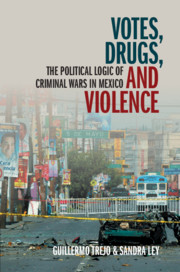Book contents
- Votes, Drugs, and Violence
- Cambridge Studies in Comparative Politics
- Votes, Drugs, and Violence
- Copyright page
- Contents
- Figures
- Maps
- Tables
- Preface
- Acronyms
- Introduction
- Part I A Political Theory of Criminal Violence
- 1 The Political Foundations of Peace and War in the Gray Zone of Criminality
- Part II The Outbreak of Inter-Cartel Wars
- Part III The State’s War Against the Cartels
- Part IV The Rise of Criminal Governance: Subverting Local Democracy in War
- Appendix A Criminal Violence in Mexico Database (CVM)
- Appendix B Criminal Attacks Against Political Actors in Mexico (CAPAM) Database
- Appendix C Chapter 2. Multivariate Regression Models (Robustness Checks)
- Appendix D Chapter 4. Multivariate Regression Models (Robustness Checks)
- Appendix E Chapter 4. Natural Experiment (Additional Information)
- Appendix F Chapter 6. Multivariate Regression Models (Robustness Checks)
- Appendix G Chapter 6. Natural Experiments (Additional Information)
- References
- Index
- Other Books in the Series (continued from page iii)
1 - The Political Foundations of Peace and War in the Gray Zone of Criminality
from Part I - A Political Theory of Criminal Violence
Published online by Cambridge University Press: 16 September 2020
- Votes, Drugs, and Violence
- Cambridge Studies in Comparative Politics
- Votes, Drugs, and Violence
- Copyright page
- Contents
- Figures
- Maps
- Tables
- Preface
- Acronyms
- Introduction
- Part I A Political Theory of Criminal Violence
- 1 The Political Foundations of Peace and War in the Gray Zone of Criminality
- Part II The Outbreak of Inter-Cartel Wars
- Part III The State’s War Against the Cartels
- Part IV The Rise of Criminal Governance: Subverting Local Democracy in War
- Appendix A Criminal Violence in Mexico Database (CVM)
- Appendix B Criminal Attacks Against Political Actors in Mexico (CAPAM) Database
- Appendix C Chapter 2. Multivariate Regression Models (Robustness Checks)
- Appendix D Chapter 4. Multivariate Regression Models (Robustness Checks)
- Appendix E Chapter 4. Natural Experiment (Additional Information)
- Appendix F Chapter 6. Multivariate Regression Models (Robustness Checks)
- Appendix G Chapter 6. Natural Experiments (Additional Information)
- References
- Index
- Other Books in the Series (continued from page iii)
Summary
This chapter develops a new theoretical framework that explains the role played by state agents in the constitution of organized criminal groups (OCGs) and why electoral politics can become a decisive factor for peace and violence in the criminal underworld. The gray zone of criminality is introduced as the ecological space where the state and crime intersect and corrupt members of state security forces and criminals give rise to OCGs.The gray zone often emerges in authoritarian regimes, where autocrats allow state specialists in violence to regulate, protect, and profit from the criminal underworld in exchange for their loyalty. When countries transition from authoritarian rule to democracy, and postauthoritarian elites fail to reform the military and the police and to dismantle state–criminal networks, democratic mechanisms become intertwined with criminal violence. Electoral competition, party alternation, and the decentralization and fragmentation of political power introduce uncertainty in the gray zone, stimulating criminal rivalry, wars, and large-scale violence. We use these definitions and propositions to explain the outbreak and escalation of inter-cartel wars in Mexico.
Keywords
- Type
- Chapter
- Information
- Votes, Drugs, and ViolenceThe Political Logic of Criminal Wars in Mexico, pp. 31 - 66Publisher: Cambridge University PressPrint publication year: 2020

